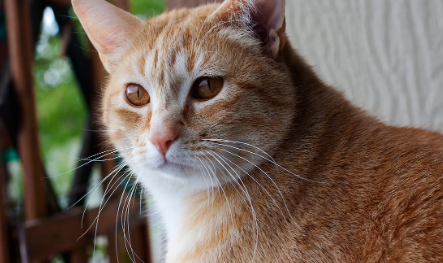Cats are enigmatic creatures with a blend of independence, curiosity, and an often elusive nature. While dogs are widely recognized for their loyalty and responsiveness to human commands, cats are seen as more aloof and indifferent. However, this raises an intriguing question: Do cats know their names? This question delves into the heart of feline cognition, communication, and the complex relationship between humans and their feline companions.
This article will explore whether cats recognize their names, how they process and respond to human communication, and what this reveals about their intelligence. With a blend of scientific research, expert opinions, and real-life examples, this article will provide a comprehensive understanding of this fascinating topic.

The Science of Feline Cognition
Understanding Animal Cognition
Animal cognition refers to the mental capacities and processes that animals use to acquire, process, store, and act on information. It encompasses perception, learning, memory, and decision-making. In recent years, the field of animal cognition has expanded significantly, revealing that animals, including cats, possess cognitive abilities once thought to be exclusive to humans.
The Feline Brain: Structure and Function
Cats have a relatively large brain in proportion to their body size, with about 300 million neurons in their cerebral cortex. This is the area of the brain responsible for complex behaviors, including decision-making, problem-solving, and social interactions. While smaller than a dog’s brain, the feline brain is structured to allow for highly developed sensory processing, memory retention, and learning.
Memory and Learning in Cats
Cats possess both short-term and long-term memory, which are crucial for learning and recognizing familiar patterns, sounds, and commands. Studies have shown that cats can remember events, places, and individuals for extended periods, indicating that they have a robust memory system that supports learning.
Do Cats Recognize Their Names?
Research Studies on Name Recognition in Cats
Several studies have been conducted to investigate whether cats recognize and respond to their names. A groundbreaking study conducted by Atsuko Saito and colleagues in 2019 demonstrated that cats do indeed recognize their names. The study involved 78 cats from various households and cat cafes. The researchers observed how the cats responded to hearing their names, as opposed to other similar-sounding words.
The results revealed that most cats responded to their names by moving their heads or ears, even when the names were spoken by unfamiliar voices. This suggests that cats can distinguish their names from other sounds and words.
How Cats Recognize Their Names
Cats primarily rely on auditory cues to recognize their names. They learn to associate the sound of their name with specific outcomes, such as receiving food, affection, or attention. This associative learning process is similar to how dogs learn commands, though cats may be less overt in their responses.
The Role of Tone and Context
The tone of voice and context in which a cat’s name is used also play a significant role in recognition. Cats are sensitive to the emotional tone of human voices and may respond differently depending on whether their name is spoken in a positive, neutral, or negative tone. For instance, a cat might come when called in a friendly tone but may ignore a harsh or angry call.
The Feline-Human Relationship: A Two-Way Street
How Cats Perceive Humans
Cats perceive humans differently than dogs do. While dogs often see humans as pack leaders, cats view us as equals or even larger versions of themselves. This perception influences how they interact with us, including how they respond to their names.
Communication Between Cats and Humans
Cats communicate with humans using a combination of vocalizations, body language, and facial expressions. They meow, purr, hiss, and use other sounds to convey their needs and emotions. When it comes to name recognition, cats may not always respond visibly, but they often acknowledge their names through subtle cues like ear twitches or head turns.
Training and Conditioning
Training a cat to respond to its name requires patience and consistency. Positive reinforcement, such as treats or affection, can be used to encourage a cat to respond when called. Over time, most cats will learn to associate their name with positive experiences, leading to more reliable responses.
The Limits of Feline Cognition
Comparing Cats to Other Animals
While cats are intelligent and capable of learning, their cognitive abilities are different from those of dogs or other animals. Cats are less inclined to please their owners, which can make them appear less responsive or trainable. However, this does not mean that they are less intelligent; rather, they are simply more independent in their behavior.
Factors That Influence Name Recognition
Several factors can influence a cat’s ability to recognize and respond to its name. These include the cat’s personality, age, and the environment in which it lives. Some cats are naturally more social and responsive, while others are more reserved or indifferent.
Practical Tips for Encouraging Name Recognition
Choosing the Right Name
The length, sound, and uniqueness of a cat’s name can affect how easily it recognizes it. Short, distinct names with clear vowel sounds are easier for cats to recognize and respond to.
Training Techniques
Using positive reinforcement and consistent repetition can help reinforce name recognition. Pairing the cat’s name with rewards like treats or playtime can create positive associations.
Understanding Your Cat’s Signals
Cats may not respond to their names in the same way dogs do, but they often show subtle signs of recognition. Learning to read these signals, such as slight ear movements or tail twitches, can help you understand when your cat is responding.
The Emotional Bond Between Cats and Their Owners
The Role of Attachment in Name Recognition
Cats form strong emotional bonds with their owners, and these bonds can influence how they respond to their names. A cat that feels secure and loved is more likely to respond to its name, as it associates the sound with positive experiences.
The Importance of Positive Interaction
Positive, consistent interactions between a cat and its owner can strengthen the bond and improve name recognition. Cats thrive on routine and familiarity, so creating a safe, loving environment can enhance their responsiveness.
The Debate: Are Cats Just Ignoring Us?
Common Misconceptions
A common misconception is that cats are ignoring their owners when they don’t respond to their names. In reality, cats may be aware of their names but choose not to respond for various reasons, such as distraction, indifference, or contentment in their current activity.
The Independent Nature of Cats
Cats are independent creatures, and this independence is often mistaken for aloofness or disinterest. Unlike dogs, cats do not feel the need to constantly please their owners, which can lead to the perception that they are ignoring us.
What Science Says
Scientific research supports the idea that cats recognize their names but may choose to respond based on their mood, environment, or the context in which their name is called. This selective responsiveness is a reflection of their independent nature rather than a lack of recognition.
Case Studies: Real-Life Examples
Household Cats
Many cat owners have observed that their cats respond to their names in various ways, from coming when called to simply acknowledging the sound. These real-life examples highlight the diversity in feline behavior and name recognition.
Cat Cafes
In environments like cat cafes, where multiple cats are present, name recognition can be observed in a social context. Some cats may respond more readily to their names, while others may be more selective, depending on their comfort level and social dynamics.
Feral Cats
Feral cats, which have had little to no human interaction, may not respond to names as domestic cats do. However, with consistent care and positive reinforcement, even feral cats can learn to recognize and respond to names over time.
The Future of Feline Cognition Research
Advances in Animal Cognition Studies
The field of animal cognition is continually evolving, with new studies shedding light on the complexities of feline intelligence and behavior. Future research may uncover more about how cats process information, recognize names, and interact with humans.
Potential Applications
Understanding feline cognition has practical applications in improving cat care, training, and communication. By recognizing the ways in which cats perceive and respond to their environment, we can create better living conditions and stronger bonds with our feline companions.
Conclusion
In summary, cats do indeed recognize their names, although their responses may vary depending on their personality, environment, and the context in which their name is used. Feline cognition is a complex and fascinating field that continues to reveal new insights into how cats think, learn, and interact with the world around them.
FAQs
Q: How can I tell if my cat recognizes its name?
A: Look for subtle cues like ear twitches, head turns, or tail movements when you call your cat’s name. These signals often indicate recognition.
Q: Can I train my cat to respond more reliably to its name?
A: Yes, using positive reinforcement, such as treats or affection, can help reinforce name recognition and encourage your cat to respond more consistently.
Q: Why does my cat sometimes ignore its name?
A: Cats may choose not to respond to their name for various reasons, including distraction, contentment, or indifference. This is a reflection of their independent nature.
Q: Do all cats recognize their names?
A: Most cats can learn to recognize their names, but individual responses may vary depending on the cat’s personality, age, and environment.
Q: How long does it take for a cat to learn its name?
A: The time it takes for a cat to learn its name can vary, but with consistent reinforcement, most cats can learn to recognize their name within a few weeks.
Additional Resources
- Saito, Atsuko, et al. “Domestic cats (Felis catus) discriminate their names from other words.” Scientific Reports 9.1 (2019): 1-8.
- Horowitz, Alexandra. “Inside of a Dog: What Dogs See, Smell, and Know.” Scribner (2010).
- McGowan, Ragen T. S., et al. “Positive reinforcement training affects the welfare of cats during handling at a veterinary hospital.” Journal of Feline Medicine and Surgery 13.6 (2011): 420-424.
- Bradshaw, John W. S. “Cat Sense: How the New Feline Science Can Make You a Better Friend to Your Pet.” Basic Books (2013).
- Kass, Philip H., et al. “Epidemiologic evidence for a causal relation between vaccination and fibrosarcoma tumorigenesis in cats.” Journal of the American Veterinary Medical Association 245.8 (2014): 993-1003.






